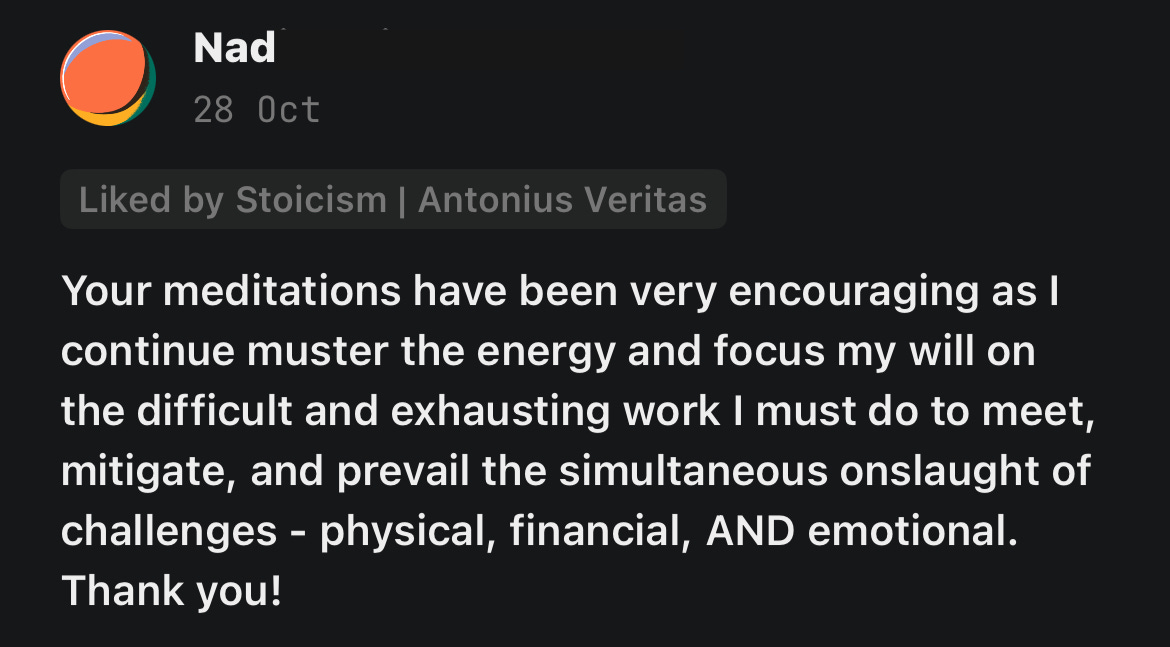“No man is more unhappy than he who never faces adversity. For he is not permitted to prove himself.” — Seneca
Part I. Who are You? In Abundance
The following is a story about the Peacock & the Crane from Aesop’s Fables,
A Peacock, puffed up with vanity, met a Crane one day, and to impress him spread his gorgeous tail in the Sun.
"Look," he said.
"What have you to compare with this? I am dressed in all the glory of the rainbow, while your feathers are gray as dust!"
The Crane spread his broad wings and flew up toward the sun.
"Follow me if you can," he said.
But the Peacock stood where he was among the birds of the barnyard, while the Crane soared in freedom far up into the blue sky.
We like to brag about the car we got.
It's why we take the long route home so more people can see how successful we are.
The latest phone is already in the shopping cart, even if our current one is still in pristine condition.
New furniture, the followers on our socials, how beautiful or handsome we are, money in the bank, the love interest we’ve charmed — become our entire essence to a fault, which is but a fraction of what it means to be human.
If we were honest with ourselves we’d say that deep down we’re this profligate to gain respect from our friends.
Tyler Durden, in the movie Fight Club, said,
We’ve left no room for rationality, practicing virtue — sharpening our minds and character to be gentle yet tough, fun yet wise, beautiful inside and out.
Sure, some of these goods are a reflection of our hard work — our contribution to society, and it’s good to be proud of and celebrate the progress we’ve made so far.
Wisdom also bids us to subtly put on airs about what we’ve accomplished as it might influence how people treat us and the opportunities we get.
But, like the peacock, peacocking can’t be all we work hard for.
Epictetus dissects our misplaced pride using the example of a horse,
“Don’t pride yourself on any assets but your own.
We could put up with a horse if it bragged of its beauty.
But don’t you see that when you boast of having a beautiful horse, you are taking credit for the horse’s traits?
What quality belongs to you?
The intelligent use of impressions1.
If you use impressions as nature prescribes, go ahead and indulge your pride, because then you will be celebrating a quality distinctly your own.”
In another passage, on the book Discourses and Selected Writings, he elaborates this sentiment saying,
“It is just charming how people boast about qualities beyond their control. For instance,
‘I am better than you because I have many estates, while you are practically starving’;
or, ‘I’m a consul,’ ‘I’m a governor,’ or ‘I have fine curly hair.’
One horse doesn’t say to another,
‘I’m better than you because I have lots of hay and barley, my reins are of gold, and my saddle is embroidered,’ but
‘I’m better because I’m faster than you.’
Every animal is judged better or worse based on its particular virtue or defect.
Is man the only creature lacking a virtue, that we have to take account of his hair, his clothes, or his ancestry?” — Epictetus
We’d be better off, happier, and freer letting our virtues shine because that’s why we were born.
As Aristotle said about happiness, a human being achieves eudaemonia2 in as much as he performs and fulfills the function he was designed for by the gods: to exercise rationality.
We have a complex brain architecture enabling us to construct language to communicate and learn.
Create intelligent technology to ease our lives.
Remember fond memories from years ago.
Envision and create a better future.
Build spaceships.
Empathize with those in need — those in pain and would use a friend.
Isn’t all that quite phenomenal?
You’re sentient.
That’s why whenever we’re depressed and anxious it’s prudent to ask ourselves if our current actions are virtuous.
If we love what fate has alloted us.
If we’re living for others.
It’s therefore prudent to journal and ask ourselves these poignant questions:
Who are we when stripped of our cherished material goods and beauty — when we lose everything today?
Will we dust ourselves, still be confident, and make the best out of the situation, or go into depression and self-pity?
How much good have we done to improve the world around us? To make our loved ones feel loved and valued? Or do we sit back, complain, consume — feel entitled?
Is our integrity intact or have we sold our souls for some pennies — fame, cheap attention?
Have we forgiven the people who wronged us or are we still holding on to hate and wishing for revenge — even if Karma might not exist?
Do our actions align with the common good or are we selfish?
What pleasures have we resisted or, has gluttony and lust had the best of us, ruining our health and relationships? Have we lost the freedom to say no?
How many days have we gone without getting angry or do we lose our shit at the slightest inconvenience?
Are we loving, magnanimous, and supportive of our friends or do we think we're better than them?
What fears have we conquered?
Good character is eternal.
It'll be there to help us take advantage of tragedy, create abundance, and handle prosperity with grace.
But people … people and things?
They'll change their minds, fail us, and leave us to suffer when we most need them.
Isn't it insane to depend on such ephemeral goods or to value them more than we'd do what sustains and gives us lasting happiness?
Epictetus told his students,
“It shows a lack of refinement to spend a lot of time exercising, eating, drinking, defecating or copulating.
Tending to the body’s needs should be done incidentally, as it were;
the mind and its functions require the bulk of our attention.”
Part II. Who are You? In Lack
The other extreme is people who complain that they can't do good because they lack the resources.
They don’t have the unfair advantages others have: wealth, quality education, gadgets, good health.
Some believe there's no way to change their lives if not by sinking into vices.
But they’re yet to understand the power of cultivating uniqueness, hard work, embracing vulnerability, strategy, mastery, social skills, and confident expression.
Marcus Aurelius wrote,
“No one can stop you from obeying the laws of your being, and nothing will happen to you that nature does not approve.”
How do we obey the laws of our being?
Do you like this meditation so far? ⭐️
Support the publication to read the rest and access 100+ premium essays & meditations.
Here’s what other readers are saying…







